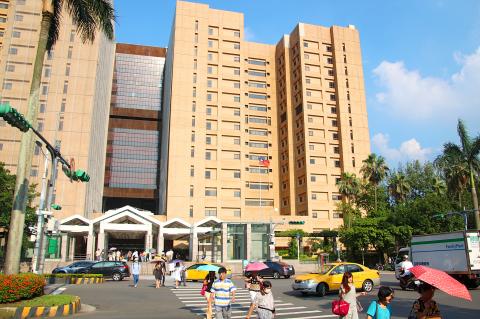National Taiwan University (NTU) Hospital attending physician Chen Kuen-feng (陳昆鋒) was found to have fabricated research data in 10 of his papers, the Chinese-language Apple Daily reported yesterday.
The fabricated data include previously published photographs that were reversed or cropped to appear different, as well as recycled phrases, the report said.
Five of the papers he cowrote with National Yang-Ming University (NYMU) professor Shiau Chung-wai (蕭崇瑋), who heads the university’s Institute of Biopharmaceutical Sciences, it said.

Photo: Chung Hung-liang, Taipei Times
The Ministry of Science and Technology has suspended Chen for 10 years, the most severe disciplinary measure after lifelong suspension, and ordered him to return research subsidies of NT$680,000 to the ministry, while Shiau has been suspended for five years and is to return NT$325,000 in research subsidies, the report said.
Shiau had met the requirements to be promoted to professor partly by submitting the fraudulent papers and could be demoted to associate professor, the report said.
Chen is also an adjunct associate professor at the NTU Graduate Institute of Molecular and Comparative Pathobiology, and has been an attending physician at the hospital’s Department of Medical Research since 2005.
He has received numerous awards for his research, including the 2012 Research Award of the Trans-Century Medical Research Foundation and the 2014 National Innovation Award.
Chen told the Apple Daily that he has a different view on the matter, but had to accept the ministry’s conclusion, as there is no way for him to appeal the case.
The newspaper quoted him as saying that he would correct the errors.
NTU president Kuan Chung-ming (管中閔), who was attending an event at National Chung Hsing University, said that academic misconduct is a complex issue and he had yet to read the full report on the case.
“Academic integrity is a basic requirement for any researcher. There is no question about that,” Kuan said.
The Ministry of Education has requested that NYMU reopen an investigation into the five papers that Shiau cowrote with Chen.
The university would follow the ministry’s instructions in the matter, NYMU said, adding that its academic integrity committee last year reviewed the papers, but did not find any academic misconduct on Shiau’s part.
Shiau has asked the university to return the research subsidies to the technology ministry, but would also seek administrative remedy, it added.
Minister of Science and Technology Chen Liang-gee (陳良基) told reporters that his ministry disciplined the academics last year, but did not release their names at the time.
The science ministry in April last year tightened its disciplinary measures for academic fraud and has since bolstered education on academic integrity, Chen Liang-gee said.
It would also consider amending regulations so that names of academics caught committing research fraud could be published, he added.
Chen Kuen-feng and Shiau were punished under an older version of the regulations that mandates lighter punishments, he said.
Under new regulations, universities whose academics are found guilty of research fraud would also be punished, he said, adding that since the new rules took effect, no academic fraud has yet been uncovered.
Additional reporting by Wu Po-hsuan and CNA

AGING: As of last month, people aged 65 or older accounted for 20.06 percent of the total population and the number of couples who got married fell by 18,685 from 2024 Taiwan has surpassed South Korea as the country least willing to have children, with an annual crude birthrate of 4.62 per 1,000 people, Ministry of the Interior data showed yesterday. The nation was previously ranked the second-lowest country in terms of total fertility rate, or the average number of children a woman has in her lifetime. However, South Korea’s fertility rate began to recover from 2023, with total fertility rate rising from 0.72 and estimated to reach 0.82 to 0.85 by last year, and the crude birthrate projected at 6.7 per 1,000 people. Japan’s crude birthrate was projected to fall below six,

US President Donald Trump in an interview with the New York Times published on Thursday said that “it’s up to” Chinese President Xi Jinping (習近平) what China does on Taiwan, but that he would be “very unhappy” with a change in the “status quo.” “He [Xi] considers it to be a part of China, and that’s up to him what he’s going to be doing, but I’ve expressed to him that I would be very unhappy if he did that, and I don’t think he’ll do that. I hope he doesn’t do that,” Trump said. Trump made the comments in the context

SELF-DEFENSE: Tokyo has accelerated its spending goal and its defense minister said the nation needs to discuss whether it should develop nuclear-powered submarines China is ramping up objections to what it sees as Japan’s desire to acquire nuclear weapons, despite Tokyo’s longstanding renunciation of such arms, deepening another fissure in the two neighbors’ increasingly tense ties. In what appears to be a concerted effort, China’s foreign and defense ministries issued statements on Thursday condemning alleged remilitarism efforts by Tokyo. The remarks came as two of the country’s top think tanks jointly issued a 29-page report framing actions by “right-wing forces” in Japan as posing a “serious threat” to world peace. While that report did not define “right-wing forces,” the Chinese Ministry of Foreign Affairs was

PREPAREDNESS: Given the difficulty of importing ammunition during wartime, the Ministry of National Defense said it would prioritize ‘coproduction’ partnerships A newly formed unit of the Marine Corps tasked with land-based security operations has recently replaced its aging, domestically produced rifles with more advanced, US-made M4A1 rifles, a source said yesterday. The unnamed source familiar with the matter said the First Security Battalion of the Marine Corps’ Air Defense and Base Guard Group has replaced its older T65K2 rifles, which have been in service since the late 1980s, with the newly received M4A1s. The source did not say exactly when the upgrade took place or how many M4A1s were issued to the battalion. The confirmation came after Chinese-language media reported